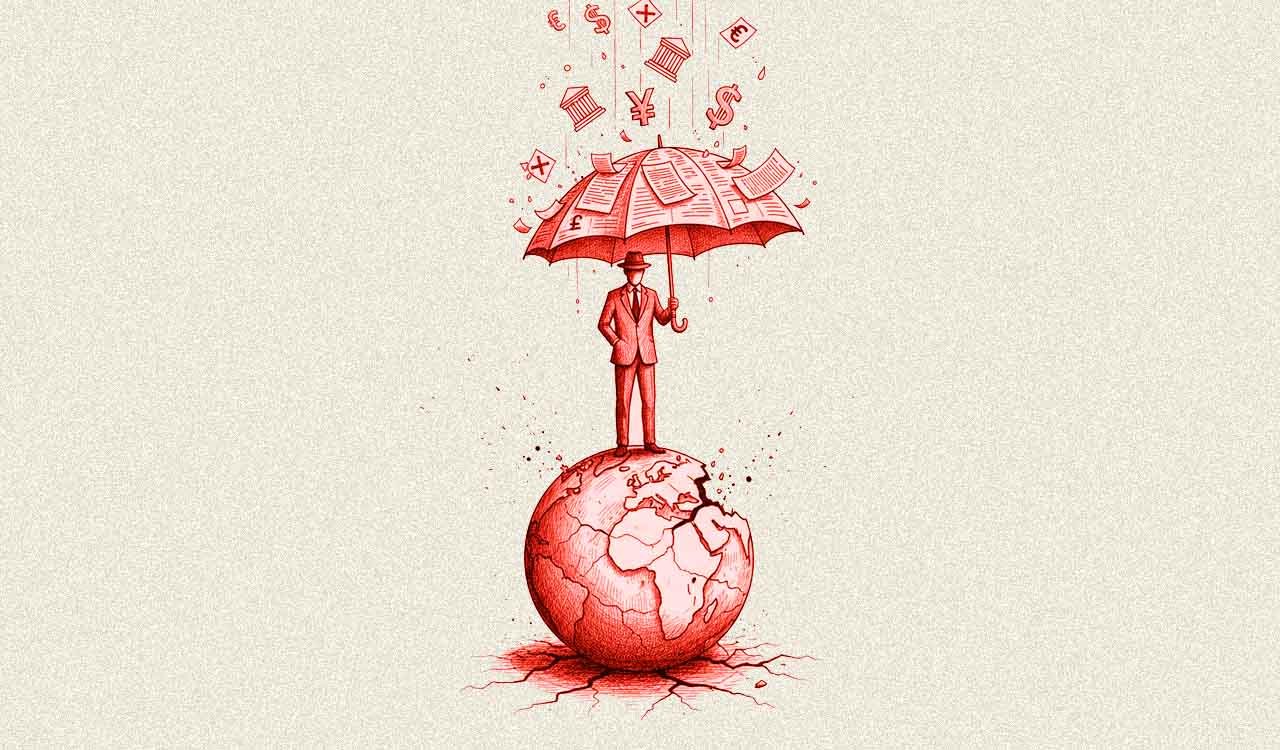-
Of the four positions of Managing Director in SBI, one position has been opened for private sector candidates and persons working in public sector financial institutions
-
Gold prices rose on the MCX on Friday, supported by a weaker US dollar and firm global cues. Traders expect the Federal Reserve to cut rates soon, while gold remains near record highs after strong investor demand and geopolitical uncertainty.
-
Equity markets opened firm on Friday with the Sensex gaining nearly 300 points and Nifty above 25,250, led by buying in realty and utilities. TCS results and renewed FII inflows buoyed sentiment, while Asian markets traded mixed.
-
The rupee traded almost flat at 88.78 against the US dollar in early trade on Friday, staying close to its all-time low amid a firm greenback and importer demand. Traders expect the RBI to monitor the currency closely.
-
The National Cooperative Policy, if executed effectively, can transform cooperatives from safety nets into engines for competitive, community-owned enterprises
-
A year after Ratan Tata’s death, Tata Trusts face internal disagreements over governance and board appointments. The infighting coincides with a Rs 7 lakh crore market value decline. Yet, Ratan Tata’s vision of ethical leadership endures
-
Governance advisory firm InGovern has highlighted risks in LG Electronics India’s IPO, including Rs 4,717 crore in disputed tax claims, royalty payments to the South Korean parent, and high promoter stake, which could impact minority shareholder influence and profit margin
-
TCS reported a 1.39 per cent rise in Q2 FY26 net profit to Rs 12,075 crore, with revenues growing 2.39 per cent to Rs 65,799 crore. Sequentially, profit fell 5.3 per cent, while revenue increased 3.7 per cent. The company declared a second interim dividend of Rs 11 per share
-
Investor enthusiasm for recent IPOs quickly turned to disappointment as BMW Ventures, Om Freight Forwarders, and Glottis Limited saw steep declines of 35–40% post-listing. Despite strong subscription numbers, selling pressure has persisted, with most new listings now below issue prices.
-
Sensex and Nifty rebounded in early trade on Thursday, driven by gains in Reliance Industries, IT stocks, and FII inflows. Asian markets showed mixed trends, Brent crude fell, and Wall Street’s record highs supported positive sentiment at Dalal Street.
-
The Indian rupee fell 3 paise to 88.78 against the US dollar on Thursday, as investors monitored US fiscal developments, trade tariff issues, and FPI activity. Domestic equities provided support, while Brent crude and the dollar index saw marginal declines.
-
Gold and silver prices eased in early trade Thursday on the MCX as investors booked profits after record highs. December gold futures slipped 0.34% to ₹1,22,789 per 10g, while silver dropped 0.75% to ₹1,48,738 per kg amid global cues.
-
RBI has conceptualised a Unified Market Interface and Unified Lending Interface to enhance fintech services, said Sanjay Malhotra. He urged inclusive, user-friendly designs, emphasised AI and digital infrastructure, and flagged growing digital fraud risks in India’s fintech ecosystem
-
Sensex and Nifty climbed in early trade on Wednesday, extending their five-day winning streak. Gains were led by IT stocks and fresh foreign fund inflows. Asian markets were mixed, while Brent crude rose 0.78%, and US markets ended lower.
-
The rupee rose two paise to 88.75 against the US dollar on Wednesday amid range-bound trading, supported by domestic equities and likely IPO inflows. Analysts expect the currency to stay between 88.50–89.00 as global and domestic factors influence market sentiment.
-
Gold prices breached $4,000 per ounce globally and ₹1.22 lakh per 10 grams in India, hitting record highs amid global uncertainty and rate cut speculation. Analysts expect the rally to continue if geopolitical tensions and economic concerns persist.
-
UIDAI Deputy Director General Abhishek Kumar Singh urges bankers to come on board, calls its the easiest and fastest way to authenticate users
-
Nissan has confirmed the launch of its all-new compact SUV, Tekton, in India by mid-2026. Inspired by Nissan Patrol, it will rival the Hyundai Creta, built on the CMF-B platform, and manufactured in India for domestic sales and exports.
-
Civil Aviation Minister K Rammohan Naidu dismissed allegations of manipulation in the investigation into the Air India plane crash that killed 260 people, saying the probe by the Aircraft Accident Investigation Bureau is transparent and conducted as per rules
-
Global digital engineering company Nagarro plans to hire around 1,000 professionals in India over the next 12–18 months to strengthen its presence in Bengaluru, Hyderabad, and Pune. CEO Manas Human said AI-driven transformation and hiring challenges are shaping market trends
-
Dubai chocolate, known for its rich fillings and crunchy texture, has surged in global popularity since 2023. Originating in the UAE, it’s inspired a wave of confections and products, driving demand—and even contributing to a pistachio shortage
-
Gold prices hit record highs on MCX amid US economic uncertainty, government shutdown fears, and expectations of further Fed rate cuts. Silver also gained, while analysts await key events including FOMC minutes, Fed Chair remarks, and China’s market reopening.
-
Gold prices surged by Rs 9,700 to Rs 1,30,300 per 10 grams in Delhi on Monday amid a depreciating rupee and safe-haven buying. Silver also rose sharply, reflecting strong demand in both domestic and international market
-
NITI Aayog CEO BVR Subrahmanyam expressed optimism over an early India-US trade agreement. Amid 50 per cent US tariffs on Indian goods, both countries are committed to negotiations, aiming to boost competitiveness and double bilateral trade to USD500 billion by 2030

